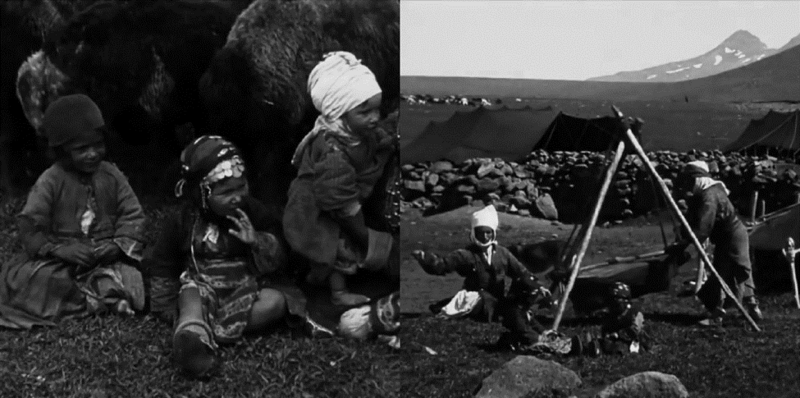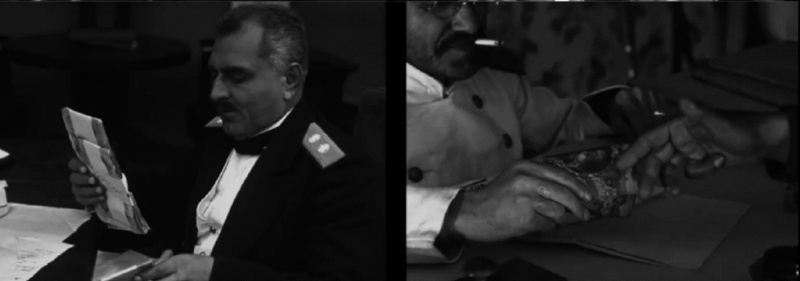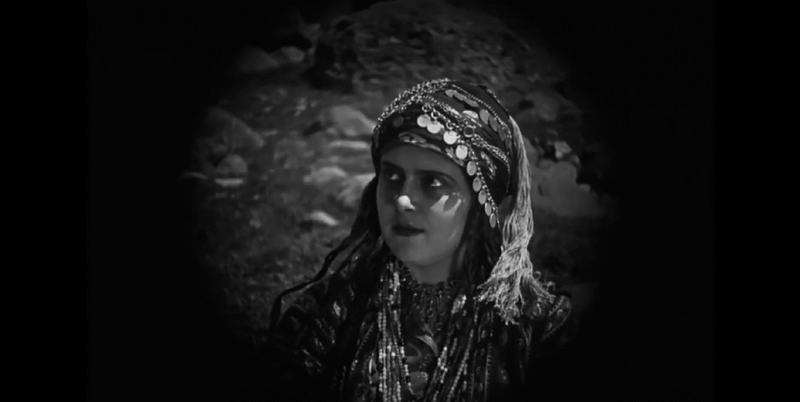Writer and Director: Hamo Beik Nazarian
Producer: Armen Kino
According to an article by Aba Lazu
Actors: Zara (Maria Tatusyan Tenazi), Seydo-Shwan (Hrachia Nirsisiyan), Taimur Bayk - son of the leader of the tribe (Karakash), Khido - brother of Zara (A. Khachaniyan), Latif Khanim - Taimur Bayk's wife (O. Gulaziyan), Masto - Zara's father (M. Manoliyan), village's sheikh (Milik Agha Malov), Nano - Zara's mother (M. Manuchariyan), Head of Kurdish Affairs (Z. Guralev), Secretary in charge of Kurdish affairs (A. Amirbeykiyan).
Cameraman (cinematographer): Arkady Yalovi
Time: 72 minutes
Country: (Yerevan- Soviet Armenia)
Release Year: 1927 (Silent Film)

Introduction
Zara is the first act that depicts Kurds and in other words, it is the foundation of Kurdish cinema. At the same time, it is one of the earliest works of Soviet Armenian cinema in the time of silent cinema. In seven episodes, Zara talks about the culture, customs, and rituals of the Yazidi Kurds through a love story. The film has strong cultural and social scenes. However, the importance of Zara is not only because it is a historical and archival work, but also because it is a political and critical response to the suffering of the Kurds under the rule of the Tsar, Agha, Sheikh, and tribal system, and also opposition to World War I, based on the aesthetics of the "school of editing", especially "Sergei Eisenstein". On another level, the film criticizes the ignorance and intellectual backwardness of the poor people and at the same time, supports the Kurdish spirit of pursuit of justice and uprising against oppression.

A summary
“Zara and Saydo are in love and are going to get married soon. But Taimur Bayg, the son of the tribal chief wants to marry Zara despite having another wife. The arrival of Tsarist officials to form a group of Kurdish volunteers on the battlefields of World War I provided Taimur Bayg with an opportunity to pay the officials and send Saydo to war. But halfway through, Saydo escapes and returns to the village, where he is arrested and sent to prison. Now seeing no obstacles, Taimur abducts Zara from his father's house and announces the time and date of the wedding. Saydo escapes from prison and thinks of revenge and freeing Zara. On the day of the wedding, he returned to the area with his friends and after killing the guards and Taimur, he released Zara.”

Analysis
Zara (Romance and Struggle)
What do the mountains of Ararat and Zara want to tell their audience? Showing a part of tribal life in a village on the slopes of Mount Ararat, or do they have more to say? The film begins with a distant view of Ararat and reaches the mountain slopes and documents the lives of ordinary people in the region. Ararat is the identity of Armenia and the Kurds living there. Ararat is a symbol of resistance and standing of hardworking people who have stood up against oppression. People with thousands of stories in their hearts. The story of the struggle of the oppressed people near Ararat. One of these historical events is the uprising of Ehsan Nuri Pasha and the establishment of the Republic of Ararat in 1927, the same year the film was made. Zara tells the story of romance, the struggle against Taimur Bayk, and the oppression of the people in 1915 during World War I. The time of the decay of Tsarist Russia, feudalism, the uprising of the people, and justice.

The main point of Zara is the oppressed people. In other words, the film begins with the daily work of the people and ends with their victory. For this reason, the film begins with real scenes (animal breeding, milking, blanket making, cooking, raising children) to show the life and culture of the Yazidi Kurds directly. To achieve this goal, Hamobek Nazariyan uses the editing method. (Editing is the method used by Soviet avant-garde cinema to create meaning and concepts by linking different images). With this tool, he seriously criticizes the Russian tsarist regime and the slave system in Kurdistan. To illustrate such circumstances, Nazariyan uses a classical narrative to tell a love story.

As mentioned earlier, Nazariyan is a supporter of the oppressed and lower-level people, but this support is not without criticism, and he criticizes their ignorance and superstition (his goal is to support and warn the people through the camera). However, the director's main criticism is of the tsarist power, tribal mechanisms, and nobility. Two components in different situations reinforce each other. The director accurately depicts the theft of officials’ money under portraits of Tsar Nicholas II and his wife. Similarly, it shows tribal chiefs, sheikhs, and guards stealing, extorting money, and violating people's rights by taking close-ups. Apart from the poor and ordinary people, Nazariyan generally portrays the authorities and those who oppress, take bribes, and steal from the people as ugly.

With the help of tribal chiefs and sheikhs, officials, and sheikhs send poor people to the battlefield and take bribes from those who have some money or sheep. Everyone seems to agree that, in the words of the director, “the Kurds are as ignorant as their sheep” and can be deceived. On the one hand, the rulers cooperate with each other, and the oppressed are not together, but also agree with the intrigues and deceptions.

The good point is that Saydo stands against the government and Taimur Bayg for love. He did not go to the battlefield (World War I), a useless war that was only death and misery for the oppressed classes. The head of Kurdish affairs and administration says, "They only take the poor (for military service) and they don't take the rich." His voice is a voice of opposition to the authorities. Because of this opposition to the authorities, he goes to prison. Escaping from prison and subsequent release of Zara and revengeing Khan are Saydo's ultimate goals. By these actions, he opposes the government, the nobles, and the sheikhs. Although the reason for this opposition is love and not a particular political consciousness, this is enough for Nazariyan to criticize a corrupt system on this pretext. He can only show the deep layers of society by criticizing the authorities of the time. For a better tomorrow, Nazariyan will reach purity by rejecting all the darkness under the shadow of Ararat for the people, and what remains is the people and Ararat.









